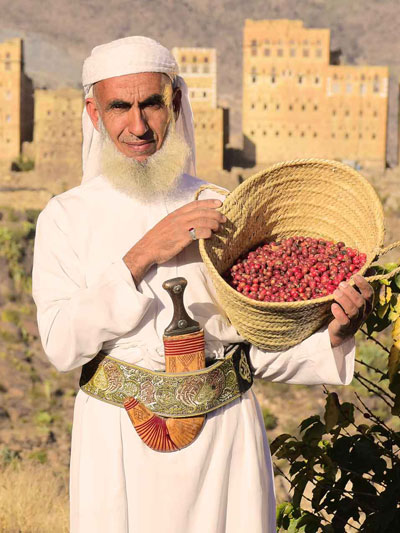


Billions
of coffee cups are consumed every single day, and millions of people drink coffee in different forms and types daily. However, very few know where coffee originated, how and when the first cup of coffee was made, and how these tiny dried green beans became the foundation of the most popular, nourishing, and widely consumed drink globally.
The story began around the year 1450 AD, when, for the first time, Sheikh Omar bin Ali Al-Shadhili (Sheikh of the Shadhili Sufi school), who was living in western Yemen, made a hot drink from roasted coffee beans for himself and his students to survive their hunger. His students collected the scattered coffee beans, as people had no use for them, and boiled them in water since they were too hard to eat. When the beans did not soften, they roasted, then ground them and made a hot drink. They noticed feeling more alert, experiencing mental clarity, and feeling full after drinking it. This led them to call it Qahwah, which later became known as coffee.
From that time, ordinary people—and Sufis in particular—began using these beans as a stimulant to stay awake during night gatherings and rituals. This very discovery marked the beginning of the world’s most common drink in today’s modern world.
From Yemen, specifically from Al-Makha seaport, these precious beans and their amazing drink spread across the globe. Named after the port, the drink became known worldwide as Mokha coffee (later spelled Mocha coffee).
During the 17th century and for two centuries afterward, Makha port monopolized the global coffee trade, and Yemen’s entire economy relied on coffee production and exportation.
Later, in the 19th century, traders from the Netherlands managed to smuggle coffee plants and cultivate them in Asian countries such as Indonesia, breaking Yemen's monopoly on the coffee trade.
By the early 20th century, Yemeni coffee production declined due to high production costs. Western importers were able to source coffee from other countries at lower prices, prompting many Yemeni farmers to turn to alternative agricultural crops.
Despite these challenges, some farmers committed themselves to preserving coffee cultivation. For them, it was not just a profession but an integral part of their Yemeni identity.
It is not uncommon to find Yemeni farming families who have cultivated coffee for five or six successive generations.
Copyrights © 2023 - Mocha Story, All Rights Reserved.